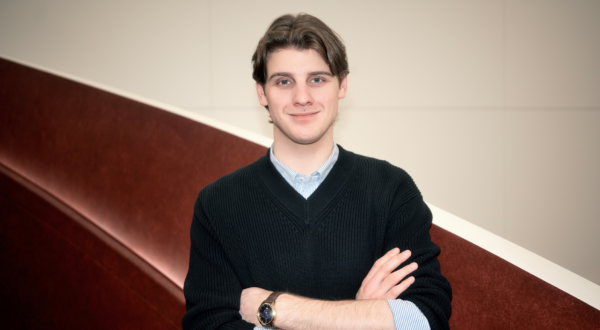Student Snapshot: Let's Agree to Disagree
Troy Alfred is a medical student from Sri Lanka who moved to Latvia in 2016. He is about to start his 11th semester at Rīga Stradiņš University (RSU) this autumn. He is one of the Founders and the current President of the Debates and Conversations Group (D&C) at RSU.
Sharmishtha Sharma is a 4th year medical student at RSU. She is originally from India, but moved to Riga at the age of 15. She is the group's Treasurer and Event Manager.
How did you come up with the idea for D&C?
Troy: I first got the idea for a group like this during the pandemic in August 2020. The pandemic was the most self-reflecting time of my life and I started seeing that there was a need for discussions.
People don't really talk too much about heavy topics and often react with anger. So I thought 'why not create a platform where everyone's respectful and you can have differing opinions, but still discuss them together?'
Sharmishtha, how did you get involved?
Sharmishtha: I heard about it from Troy, who is a friend of mine. When I hang out with my friends, we also often have discussions and talk about deep questions and I have been interested in debating since childhood. I was a member of the Model United Nations (MUN) in high school. If my career in medicine would have stalled, my back-up plan was to become a lawyer or to get into international affairs.
What is the goal of the group?
Sharmishtha: D&C is a platform for structured debates and open-ended conversations. It was created to enhance and broaden our knowledge, to discuss controversial topics, to train communication and social skills, to hold respectful arguments, and to improve listening skills.
Through D&C we hope that people can learn how not to take arguments personally and understand another person’s viewpoint.
The group is also meant to improve critical thinking and aid personal development. To sum up, debates help members get broader knowledge across several disciplines outside their academic subjects.
Are you planning any collaborations with the Latvian debate club organised by the RSU Student Union (RSU SP)?
Troy: We organised the Fashion Revolution Event together with RSU SP and the RSU International Student Association (RSU ISA).We've reached out to the RSU SP debate group and invited them to all our meetings. We hope to work together more in the future. It would be a great opportunity to bring together professors, Latvian students and international students.
I realised that to make a society like this work, it's important to make connections. Not only to the Latvian students, but also to our teachers.
How do your meetings run?
Troy: We usually have two meetings per month. The first meeting is a conversation where we discuss topics openly. Then two weeks later there's a debate. We randomly sort participants into groups and ask them to debate the topic. There are no winners or losers because we're just here to discuss. We hear other opinions and why the “other side” thinks the way they do. I think it's important to try to understand the reasoning behind other people's opinions and be receptive to them.
How do you decide on the topics and what have you discussed so far?
Troy: I was focused on having intellectual discussions about topics that might make people say 'I have a mixed opinion about this'.
The point of the group is that we all know a little bit about individual topics, but we would benefit from knowing a bit more, asking around, and being more receptive.
I am interested in topics that are controversial, that people might shy away from talking about.
Past topics for discussion include:
- Vaccination (with guest speaker Prof. Aigars Reinis, RSU Department of Biology & Microbiology)
- Veganism
- Borat the movie
- Obesity and beauty standards
- The legalisation of marijuana (with guest speaker Herbologist Ilva Minaveja)
- Legistlation affecting the LGBTQ community
- The war on drugs (with guest speaker Professor Dmitrijs Kustovs, RSU Department of Pharmacology)
Since you aren't afraid to broach controversial topics, do you have a way of moderating to make sure everyone feels safe and heard?
Sharmishtha: There is always a moderator from our group, who is responsible for conducting the meeting. The invited guest professor is also present so that we have an expert’s opinion on the chosen topic. To maintain flow and avoid conflicts, we have a strike act that helps monitor conflicts and make sure they don't get too heated. If someone is being offensive or too personal, we give them a warning. After the third warning, they are banned from joining the meeting for a month.
Have you had to use it so far?
Sharmishtha: Not yet. So far, the meetings and people's contribution has been amazing. We have had great discussions on different topics and it has been wonderful to see how differently people can think on a single topic.
What is something that you have already gained from your participation in this group?
Sharmishtha: It has made me a better listener and learn to accept and tolerate other viewpoints.
Troy: I've learnt to articulate myself better, and handle discussions in a more balanced way. I like the sense of achievement you feel after a good discussion.
Do you have any plans for the autumn?
Troy: The next big event for us will be the elections this year and we will be focusing on creating a podcast. This will take some time and effort, but I'm looking forward to working on it!
The Debates and Conversations Group page
Previous interview with Troy Alfred here
Related news
 Learning never stops: IADS European Associate Regional Representative and RSU double degree student Georgs Alberts PimanovsStudent Snapshot
Learning never stops: IADS European Associate Regional Representative and RSU double degree student Georgs Alberts PimanovsStudent Snapshot/Student_Snapshot/DNC_fashion-event_.jpg)
/Student_Snapshot/DNC_zoom-event-screenshot.png)



